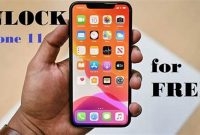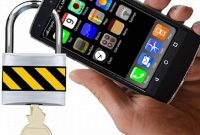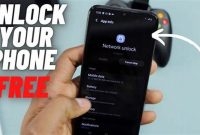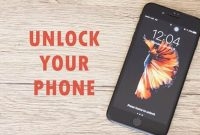If you’ve recently purchased a new phone, you may be eager to use it with a carrier that offers reliable service and affordable plans. But if the phone is locked to a specific carrier, you may feel stuck with limited options. Luckily, unlocking your phone allows you to use it with any carrier of your choice. In this complete guide, we’ll walk you through the steps to take to unlock your phone, whether it’s an iPhone or an Android device, and provide helpful tips to make the process as smooth and easy as possible.

What is Phone Unlocking?
Phone unlocking is simply the process of removing software restrictions that were imposed by the manufacturer or carrier that limit the use of a mobile device to a specific carrier only. Once the process is completed, the device can be used with any carrier’s SIM card. The process can be done in various ways, depending on the type of mobile device being used and the carrier it’s locked to.
Why are Phones Locked to Specific Carriers?
Manufacturers may lock their phones to specific carriers primarily to ensure that customers exclusively use their devices with their network as a means of retaining their customer base. It’s also because carriers subsidize the cost of devices for customers in exchange for their commitment to long-term contracts or plans.
Unlocking a phone that is tied to a specific carrier was previously against the law, but it’s now allowed by carriers, and some countries even have laws that mandate the ability to unlock a mobile device after a service contract or payment has been completed. Here’s what you need to know about the different methods for carrier unlocking a mobile device:
- Software unlocking – This is accomplished through downloading and running software and typically doesn’t require any technical expertise on the part of the user.
- Hardware unlocking – This method involves the opening of a deviceto access the internal electronics and make the necessary changes to permit other carriers by installing new hardware.
- IMEI unlocking – This method works by altering the device’s unique IMEI number in the database of the mobile carrier. It is considered a legal and permanent mode of unlocking.
Why Do You Need to Unlock Your Phone?
Unlocking your phone provides you with the freedom to switch between carriers, use local SIM cards when traveling, and increase the resale value of your device. But why should you consider doing it? Here are some reasons:
1. It Allows You to Switch to a Better Carrier or Plan
Are you unhappy with your current carrier’s service, but you’re stuck under contract for another year? Unlocking your phone means you can switch to a different carrier whenever you want. You can shop around for a better plan or service that fits your needs, rather than sticking with one that doesn’t. You may even find that a smaller carrier offers better customer service and a cheaper plan, especially if you don’t need the latest and greatest phone.
2. It Lets You Use Local SIM Cards When Traveling
If you travel internationally, you know that using your phone abroad can be expensive. Roaming charges can quickly add up, making it difficult to stay connected with friends and family. Unlocking your phone means you can buy a local SIM card when you arrive at your destination. This lets you use the local network, which is often cheaper and faster than international roaming. You also don’t have to worry about accidentally racking up a huge bill when you get home.
But it’s not just international travel where this comes in handy. Even in your own country, different carriers have different coverage areas – especially if you’re venturing out into rural areas. Unlocked phones can switch to the best available network, giving you better call quality and faster internet speeds, even if your original carrier has no coverage in the area.
3. It Increases the Resale Value of Your Device
When it’s time to upgrade your phone, you’ll likely want to sell your old one to recoup some of the costs. An unlocked phone is more valuable to potential buyers for the exact same reasons we’ve listed above – they can switch to a better carrier or plan, or use it when traveling or in remote areas. This means you’ll be able to sell your phone for a higher price than if it was locked to a specific carrier.
Is Phone Unlocking Legal?
Unlocking your phone can give you the freedom to switch carriers or use your device abroad without being charged exorbitant fees. Before you start, it’s important to research the laws in your specific region to avoid any potential legal issues. While phone unlocking is legal in many countries, such as the United States, there are still regulations that you need to be aware of.
Unlocking Your Phone in the United States
In the United States, the Unlocking Consumer Choice and Wireless Competition Act was passed in 2014, making it legal for consumers to unlock their phones. This law allows consumers to switch carriers and use any compatible network of their choice. However, it’s important to note that this law only applies to phones that are fully paid off or those that were purchased before February 11th, 2015. If you purchased a phone after this date, you may need to wait until your contract is up or pay an early termination fee to unlock your device.
It’s also important to note that while the act makes phone unlocking legal, it doesn’t require carriers to unlock phones for their customers. Some carriers may still have restrictions or fees associated with phone unlocking, so it’s best to check with them before attempting to unlock your device.
Unlocking Your Phone in Other Countries
Other countries have their own regulations when it comes to phone unlocking. In Canada, for example, it’s legal to unlock your phone, but carriers can charge a fee for the service. In the European Union, phone unlocking is also legal, and carriers are required to unlock phones upon request after a certain period of time.
It’s important to research the laws in your specific region and check with your carrier before attempting to unlock your device. Failure to do so could result in potential legal issues, or even damage to your device.
How Can You Tell If Your Phone is Locked?
If you have recently purchased a used phone or travel internationally, you may be wondering if your phone is locked. Carriers sometimes “lock” a phone to prevent it from being used on a different network. Fortunately, it is easy to check if your phone is locked.
Insert a Different Carrier’s SIM Card
One way to check if your phone is locked is to insert a SIM card from a different carrier. If your phone is locked, you will see an error message or be prompted to enter an unlock code to use the phone with the new SIM card. If you do not see these prompts and can make calls and send texts without any issues, then your phone is likely unlocked.
Contact Your Carrier
If you are unable to determine if your phone is locked by inserting a different carrier’s SIM card, you can contact your carrier directly. The carrier can confirm if your phone is locked and provide steps to unlock it if necessary.
It is important to note that some newer phones may not have SIM unlock codes. Instead, they may require an “unlock app” to be downloaded and installed on the phone.
How Can You Unlock Your Phone?
If you have a phone that is locked to a carrier, you might need to unlock it to use it with another carrier’s SIM card. There are three ways to unlock a phone: through your carrier, a third-party service, or by using unlock codes purchased online.
1. Carrier Unlock
You may be able to get your phone carrier-unlocked by your existing service provider. The process will vary depending on your carrier’s policies and the type of phone you have. Some carriers will unlock the phone for free after a certain amount of time has passed, while others may charge a fee or have specific requirements that need to be met before they will unlock the phone.
2. Third-Party Unlocking Services
There are also third-party services that can help you unlock your phone. These services will typically charge a fee, but they can often unlock phones that carriers won’t unlock.
- One popular service is DoctorSIM, which can unlock phones from over 190 carriers worldwide.
- IMEIUnlockSIM is another service that offers carrier unlocks for a variety of phone models.
3. Online Unlock Codes
You can also try to unlock your phone using unlock codes that you can purchase online. These codes are specific to your phone model and carrier, and can typically be entered on your phone’s keypad to unlock it.
Before purchasing an unlock code, make sure that your phone is compatible and that the website you are purchasing from is reputable. Some unreliable services can provide incorrect codes, which can permanently damage your phone or prevent it from being unlocked.
What Are the Benefits of Using a Third-Party Unlocking Service?
If you’ve purchased a phone through your carrier, it’s likely locked to their network. This means you can only use their SIM card for service and cannot switch to another carrier without unlocking the device. While you can go through your carrier to unlock your phone, there are third-party services that offer unlocking solutions as well. In this section, we’ll discuss the benefits of using a third-party unlocking service versus going through your carrier.
Faster and More Convenient
Using a third-party unlocking service can be a faster and more convenient option than going through your carrier. Most carrier unlocking processes require a waiting period of several days or weeks before the device can be unlocked. On the other hand, third-party services typically provide unlocking solutions within a few hours or even minutes of your request.
Expertise and Variety
Third-party unlocking services may also have more expertise in unlocking various types of devices. These services tend to focus primarily on unlocking and may have developed specialized processes for unlocking specific phones or types of devices. Additionally, they may offer unlocking solutions for a wider variety of phones and carriers than your carrier may provide.
Lower Prices
One of the main benefits of using a third-party unlocking service is the potential for lower prices. While carrier unlocking fees can range from $25 to over $100, third-party services may offer much lower prices for their unlocking services. However, it’s important to beware of uncommonly low prices as this can signify a scam or low-quality service.
Reputable and Reliable Service
When using a third-party unlocking service, it’s important to use a reputable and reliable service to avoid scams and potential harm to your device. Before selecting a service, do your research and look for reviews and testimonials from past customers. Additionally, make sure the service provides customer support and guarantees their unlocking solution will be effective.
Frequently Asked Questions
| Questions | Answers |
|---|---|
| Can I unlock my phone without a SIM card? | Yes, you can! Simply connect your phone to a Wi-Fi network and follow the instructions provided by your carrier or use a third-party unlocking service. |
| Is unlocking my phone legal? | Yes, it is legal to unlock your phone in most countries. However, there may be some exceptions, so it’s always a good idea to check your country’s laws. |
| Will unlocking my phone void its warranty? | It depends on your carrier and phone manufacturer’s policies. In most cases, unlocking your phone will not void its warranty, but it’s always best to check first. |
| Is unlocking my phone difficult? | Not at all! Most carriers provide instructions on how to unlock your phone, and there are also many third-party unlocking services available that make it a simple process. |
| Can I unlock any phone to any carrier? | Not necessarily. Some phones are only compatible with certain carriers, so it’s important to check if your phone is eligible for unlocking with your desired carrier. |
Thank You for Reading!
We hope that this guide has been helpful in showing you how to unlock your phone to any carrier. Remember to always check with your carrier’s policies and laws in your country before proceeding. If you have any questions, feel free to leave us a comment below. And don’t forget to visit us again for more informative articles!





